These days, there are so many film polls and online Top 10 lists that the idea of ranking movies can seem rather old hat. But amid all that list-bait, there is one movie poll taken more seriously than all others: Sight & Sound's once-a-decade poll of the greatest films of all time. The British film magazine has been doing this ranking since 1952, when Bicycle Thieves beat out two Charlie Chaplin films (City Lights and The Gold Rush) for the top spot. Ever since, Citizen Kane has been the No. 1 film, including in the 2002 edition, when 46 of the 145 critics polled put it in their individual Top 10. (Sight & Sound doesn't do weighted ballots: Your No. 1 movie and your No. 10 movie count the same.)
Because the magazine does its rankings only once ever 10 years—and because it manages to be both selective and global about giving out its ballots, enfranchising critics from Japan, Hong Kong, South Africa, and India, in addition to the U.S. and U.K.—the Sight & Sound list actually feels legitimate and significant in a way that most polls just don't. Being invited to vote is an honor, one that's taken seriously. Roger Ebert, who's been voting in the poll since 1972, recently wrote not one, but two posts where he laid out his thought process for exactly how he was picking his Top 10 films for this year's edition. His studiousness was obvious. "Apart from my annual year's best lists," he wrote, "this is the only list I vote in."
It's sentiments like that that explain why Sight & Sound's poll matters. It might also explain why, at least in the poll from 10 years ago, recent movies got little love. And by "recent," I mean anything from 1970 to the present: Indeed, only a handful of films since 1972 got even five votes. (The most popular was The Godfather and The Godfather Part II, which as a pair ended up at No. 4 on the 2002 list.) This isn't to say that recent movies aren't good enough; it's just that these critics tended to lean toward older, more established titles, preferring to take a wait-and-see attitude to newer films to determine if they held up over time. (For what it's worth, directors were polled separately, and while their choices were a little more inclusive of somewhat newer movies, like Raging Bull and Apocalypse Now, they overwhelmingly preferred movies from the '40s to the '60s.)
By the way, here was the Top 10 of the critics' poll in 2002:
1. Citizen Kane
2. Vertigo
3. The Rules of the Game
4. The Godfather and The Godfather Part II
5. Tokyo Story
6. 2001: A Space Odyssey
7. Battleship Potemkin
7. Sunrise (tie)
9. 8 1/2
10. Singin' in the Rain
Because of the complaints of some that critics are favoring reliable, older classics rather than embracing newer groundbreaking films—in the same way that most "best album" polls are, unsurprisingly, topped by Sgt. Pepper or, if they're feeling really frisky, another Beatles album—there's some question about whether this year's poll results, which will be announced in August, will reflect a shift in the canon. But if past results suggest anything, it's that when change comes, it comes slowly: 1958's Vertigo cracked the Top 10 in 1982; 1968's 2001: A Space Odyssey made the Top 10 in 1992; and the first two Godfather films (which came out in 1972 and 1974) landed in the Top 10 in 2002.
With that in mind, I wanted to try and guess what five films from the 1990s might someday enter the upper echelon of the Sight & Sound poll. I feel pretty confident none of these will make the Top 10 this year. (Last time around, only three movies from the 1980s sneaked into the Top 60: Fanny and Alexander, Blade Runner, and Shoah.) Still, if you look at the trends of how S&S voters cast their ballots, I think these five '90s offerings stand a decent chance down the line. Check back in 10 or 20 years to see how off I was:
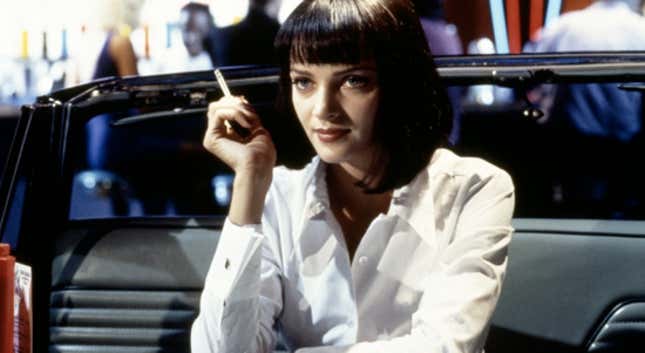
Pulp Fiction (1994)
If there's an official "Movie of the '90s," it's probably director Quentin Tarantino's temporally screwy crime film. (Perhaps you want to argue for Forrest Gump, Schindler's List, or Goodfellas for that "Movie of the '90s" title. I would say that not that many critics love Gump, Spielberg has had a tough time wowing S&S voters in the past, and my hunch is that Martin Scorsese's earlier films, like Taxi Driver and Raging Bull, will probably be the ones critics gravitate toward on their ballot.) But whether you love or hate Tarantino, he has emerged as one of the most indelible new filmmakers of the last 20 years, and this poll loves auteurs who take their auteur status rather seriously. Plus, Pulp Fiction already received three votes in the 2002 poll, a mere eight years after the film came out. Tarantino's critical standing has only grown since.
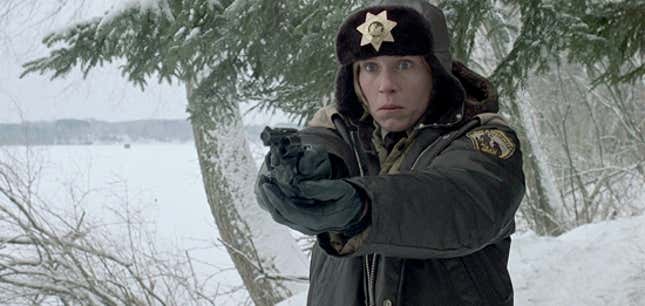
Fargo (1996)
By and large, the S&S voters tend to consolidate their votes around one film per iconic director. Sure, everybody loves Hitchcock, but over time critics have decided that Vertigo is his masterpiece, hence its current standing at No. 2 on the list. (By comparison, Akira Kurosawa is a beloved figure as well, but because some critics vote for Rashomon and some vote for Seven Samurai, he currently isn't in the Top 10 at all.) The Coen brothers will be one of those interesting cases going forward. Assuming they're still widely admired in the future, which one movie of theirs will voters champion? Fans might cite Blood Simple or Raising Arizona or Miller's Crossing or No Country for Old Men. But if the consolidation process happens, my hunch is that it will happen around Fargo. Many consider Fargo the beginning of their "mature" period, even though it combines black comedy with drama, and it's one of their most critically acclaimed. It's very possible No Country for Old Men might supplant it, but outside of The Godfather and The Godfather Part II, the voters usually don't favor Best Picture winners.
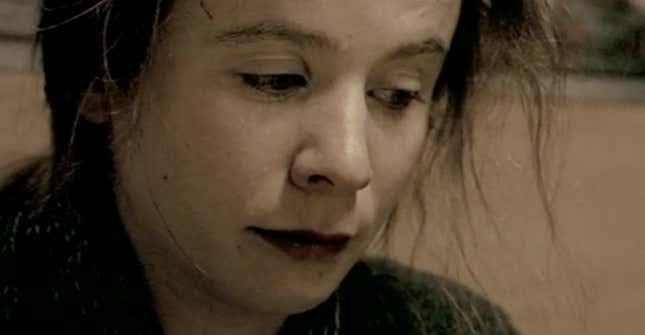
Breaking the Waves (1996)
What's important to remember about Sight & Sound's poll is that the magazine is simply asking voters for their picks for the "greatest" movies of all time. That doesn't mean "most adored"—if so, Casablanca would do a lot better than it does. No, the movies that end up in the Top 10, with the exception of a Singin' in the Rain, are often big, ambitious films that can be pretty divisive when they first come out. Vertigo, 2001 and 8 1/2 all have their detractors, but over time they've been embraced for their sheer audacity. So that's why I'm going with Lars von Trier's Breaking the Waves, although I fully acknowledge a lot of this movie's future standing will depend on how critics perceive von Trier in the upcoming decades. Yes, he's a loudmouth, but a lot of critics also think he's a genius. And outside of maybe Dogville, Breaking the Waves is his one movie that most proclaims itself A MAJOR FILM. Four people were willing to vote for it in 2002; more may join their ranks in 10 years' time.
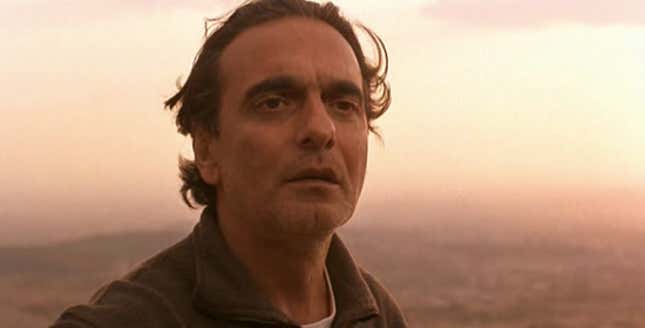
Taste of Cherry (1997)
For decades, the Sight & Sound poll has been dominated by a small collection of universally admired foreign filmmakers: Bergman, Bresson, Godard, Fellini, Antonioni, Kurosawa, and so on. But while these directors are understandably celebrated, the voters' unwillingness to bring in newer artistic voices creates the impression that there aren't great international filmmakers anymore. Which isn't true at all when you consider Hou Hsiao-hsien, Wong Kar-wai, Jia Zhangke, Michael Haneke, and the late Edward Yang. The tricky thing with all these directors is that they either don't have just one official "masterpiece" or their best film might well have come after the '90s. (I have a feeling Yang's 2000 drama Yi Yi may make a major showing in this poll.) With all that said, my pick is from another foreign filmmaker who has several highlights in the decade. It's Iranian director Abbas Kiarostami's Taste of Cherry, which tells the simple story of a man (Homayoun Ershadi) driving through Tehran hoping to find someone who will bury his body after he commits suicide. You could make the case for several other Kiarostami films as well—like Close-Up, Through the Olive Trees and The Wind Will Carry Us—but this drama's measured pace, simple story, and universal themes echo those in past films beloved by voters, including Bicycle Thieves and Tokyo Story.
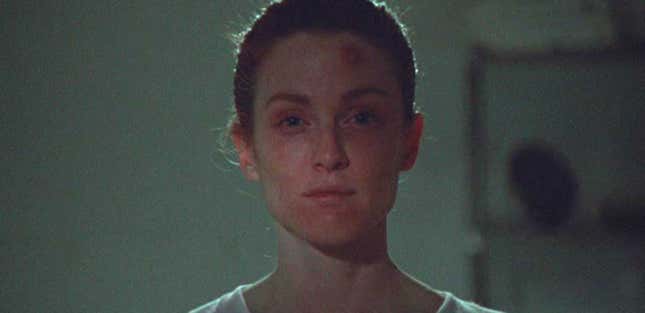
Safe (1995)
Not to be confused with the recent Jason Statham film, Safe is the brilliant, unsettling character study from writer-director Todd Haynes about a housewife (played by Julianne Moore) living in the Valley who suddenly starts noticing that she's become allergic to, well, everything. The movie is part psychological horror film, part social commentary, and I admit I'm taking a major risk by including it. (Safe is the only one of my five picks that didn't get any votes in 2002.) But Haynes's reputation has risen since the 2002 poll thanks to Far From Heaven and I'm Not There. Safe topped The Village Voice's "Best of the '90s" poll, and its themes—environmental panic, gender inequality, the dangerous seductiveness of charismatic cult-like figures—are only getting more resonant as times goes on. If the voters want to go for a film that best expresses the anxiety of the modern age, they'd be hard-pressed to find a better choice from the '90s than this.
Grierson & Leitch is a regular column about the movies. Follow us on Twitter, @griersonleitch. Top image by Jim Cooke.